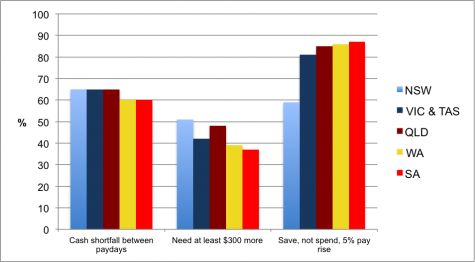Almost two-thirds of Australian households (63%) say they have been strapped for cash between pay days at some stage and one in three have used a credit card to tide them over. Almost half (46%) say it would take at least an extra $300 per week to be comfortable with their take-home pay, with NSW households faring the worst.
These are the latest findings of research conducted earlier this month by ING, which confirms many Australians are struggling to make ends meet and build personal savings.
Key findings
Only 9% of Australians are entirely comfortable with their take-home salary, and 46% say they would need at least an extra $300 per week to feel comfortable with their take-home pay.
63% of households have been stretched between pay days at some stage. 15% say they are ‘always’ stretched between pay days. Households that have been stretched between pay days make ends meet by:
- 57% - staying at home instead of going out
- 49% - cooking cheaper meals
- 35% - dipping into savings
- 33% - rely on credit cards to carry over until payday.
Overall financial wellbeing – which includes credit card and mortgage debt, savings, investments, household income and capacity to pay bills – is down slightly from the final quarter of last year from 110.8 to 109.2
Making ends meet – almost 60% don’t go out
Of those households that have struggled between pay days, 57% make ends meet by staying at home rather than going out, and half (49%) cook cheaper meals. One in three (35%) dip into savings and 33% rely on their credit card to carry over until payday – 25% of these people say they are already ‘very uncomfortable’ with their card debt.
Only 10% of households that have experienced a cash shortage between pay days have borrowed money from family members to get by.
Most people would save a pay rise
Offered the prospect of a more achievable 5% pay rise, only 11% of households would spend the extra cash. Over eight out of ten (82%) would save the money in some way by:
- 36% building a buffer of savings
- 24% paying down credit card debts or other bills
- 18% putting the money towards mortgage repayments
- 5% make an extra superannuation payment.
Households in NSW would be less likely to save a 5% pay rise, while those in Western Australia and South Australia would be most likely to do so.
“Although many Australians are experiencing a shortfall of cash between pay days, these households are likely to be including savings and debt repayments into their monthly commitments. With this in mind, Australians continue to take a sensible approach to household financial management,” according to John Arnott, Executive Director with ING Direct.
“Further supporting this is the fact that 82% of households would put a 5% pay rise towards growing savings or paying down debt,” added Mr Arnott.
Table 1: Comparison of key findings by state



















__small.png)










